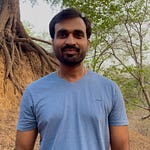The Pehli Peedi Fellowship presents the first in a series of stories highlighting the experiences of first-generation students across India.
Shruti Botare, 22-years old, shares her journey from a small village to the classrooms of Fergusson College and Ashoka University. Battling caste discrimination, financial hardship, and language barriers, Shruti reflects on the transformative role of education—not just in her own life, but in reshaping the aspirations of her community.
“Being here is monumental – I come from a family where seven generations never had the chance to attend college. My parents are landless laborers; working on someone else's farm for survival is inherently humiliating. Seeing my sister earn and command respect shows me education empowers not just the individual, but the entire community. It shifts dynamics.”
Read her full story below. Profile by Bhumeshwari.
Bhumeshwari: Please tell me about yourself.
Shruti: I am from a small village named Parsodi, located in the Yavatmal District of Maharashtra. We’re from the Gond-Gowari tribe. I have three sisters. While my studied up to the 8th grade, my father does not have any formal education. They both work as daily wage labourers. My siblings and I also used to work as labourers on weekends to support the family.
I completed my graduation from Fergusson College and I am currently a fellow at Ashoka University.
Bhumeshwari: How was your experience at school?
Shruti: I went to a government school in my village and studied in Marathi. Growing up, education wasn’t a priority in our community. Even when I was in the 12th grade, I saw four girls get married before completing their education. Many students do not pursue higher education.
In school, I faced a lot of discrimination because of my caste – I was excluded from activities, programs, and leadership roles. This crushes confidence and pushes marginalized students away from higher education.
Bhumeshwari: What motivated you to break this cycle?
Shruti: My older sister. She’s three years older than me. When my sister completed her graduation, my parents wanted to get her married, but she forcefully denied—she wanted to study further. She completed her Master’s from Azim Premji University and now works with an NGO. She was the one who had filled in my application form for Fergusson college after I passed the 12th grade exam. She guided me throughout the process.
Bhumeshwari: Describe your transition to college. What were the biggest hurdles?
Shruti: There were immense challenges. First, the language barrier: my entire schooling was in Marathi, but then suddenly, I had to attend lectures that were in English. Second, finances: my family couldn’t afford the fees ao Eklavya India Foundation stepped in, covering my tuitions fees. Accommodation was another struggle – I stayed in a free government hostel, but the 2-hour commute to Fergusson drained me. These pressures impacted my academics; my first-semester grades were low.
Bhumeshwari: Did you face barriers within the college environment itself?
Shruti: During my time at Fergusson College, I had a very supportive friend circle, which made it easier to sustain myself there. It felt like we existed for each other. However, with the faculty, I sensed class bias. Students like me were often pushed towards less challenging courses, while bright, good-looking, elite peers received encouragement for advanced opportunities like studying abroad. One professor openly doubted my potential. When I got selected for the prestigious Young India Fellowship (YIF), she was shocked – she couldn’t believe I achieved it. That disbelief was disheartening.
Bhumeshwari: You’re now at Ashoka University. How does it compare?
Shruti: Being here is monumental – I come from a family where seven generations never had the chance to attend college. To fit in, I started observing the people around me. I consciously evolved – my dress, speech, even some cultural expressions. I embraced these changes positively; it felt like exploring a new world. Initially, I questioned Ashoka’s inclusivity. I felt isolated, like people weren’t willing to listen. But over time, I found my community – other first-generation learners. We understand each other’s struggles. However, biases linger. Judgments based on English fluency, accent, or clothing persist.
Bhumeshwari: What are your aspirations?
Shruti: My dream is to study at Harvard University, but financial constraints are a big barrier. My immediate, practical goal is to find a stable job and be financially independent. That is my current definition of success. Securing a scholarship for further studies is uncertain, and that worries me deeply. I need to work for 2-3 years to fund my dream.
Bhumeshwari: What support systems keep you going?
Shruti: My YIF studies are funded by a 100% scholarship. Mentorship is crucial. I have a formal university mentor, but my most significant support is my cousin, also a YIF graduate. He’s part of the Lallan Top YouTube channel now. His kindness and support have been invaluable to me.
Bhumeshwari: What key message do you have for professors and peers?
Shruti: Practice genuine empathy. Try stepping into our shoes and understand our journeys. We have overcome immense systemic hurdles that others might not see. Inclusivity means actively listening and believing in our potential, not making assumptions based on background or accent. University programs meant to help, like language support programmes, often fail because marginalized students lack the confidence to approach coordinators—they need to be more proactive and welcoming.
Bhumeshwari: How has this journey changed you—and the way your community sees you?
Shruti: I’ve fought constantly to prove I belong. I may not have been the top student, but my resilience matters. I see girls in my village now inspired to pursue education because of me. Gaining respect and moving towards financial independence is transformative. My parents are landless laborers; working on someone else's farm for survival is inherently humiliating. Seeing my sister earn and command respect shows me education empowers not just the individual, but the entire community. It shifts dynamics.
Bhumeshwari: What’s your advice for other first-generation students?
Shruti: Step out of your village. Claim the opportunities you deserve. Challenge yourself relentlessly and leave your comfort zone. Society might try to suppress you – rise above it. Face obstacles head-on but remember self-care is non-negotiable. Protect your mental health. For me, reading and spending time with friends – it’s therapy. And crucially: strive for financial independence early. It’s foundational for real freedom and pursuing bigger dreams.
Bhumeshwari: Share an achievement that embodies your journey.
Shruti: I worked on a project called "Kadam Forward" with three peers. We provided career counseling through workshops and designed a website in collaboration with a government school for marginalized students. Coming from a marginalized community, I understand the barriers faced by these individuals. I aim to inspire them through my journey, as they often lack access to learning resources and guidance on choosing the right path.
This is an ongoing series of profiles documenting the experiences of young people across India. Stay tuned for more stories from first-generation students across India. Follow us on social media for more updates.














Share this post